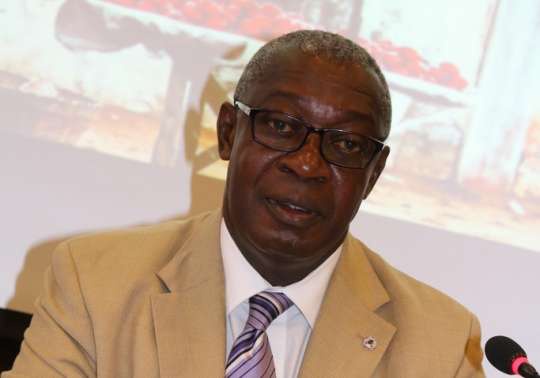
Flashback: Govt insensitive to the people's health - Prof Badu Akosa
Click to read all about coronavirus →
Ghana's failure to implement a ban on public smoking has placed non-smokers under serious health risk, this, the former Director-General of the Ghana Health Service, Professor Agyeman Badu Akosa describes as insensitive on the part of the government.
Prof. Akosa who spoke in an interview with GNA on May 31, 2006, mentioned that he was alarmed by the increasing rate of death associated with tobacco smoking and called for stricter measures to protect the populace.
"The absence of a legislation to ban smoking of cigarettes in all public places, the ban on advertisements of tobacco products and the imposition of high taxes on tobacco products are just not doing us any good but rather giving the tobacco manufacturers the opportunity to penetrate our market".
In 2012, Ghana enacted and implemented a national Tobacco Control Act, the Public Health Act 851, which prohibited smoking in all public places. Due to the lack of compliance with the policy, people continue to smoke at public places.
Read the full story originally published on May 31, 2006, on Ghanaweb
Professor Agyeman Badu Akosa, Director-General of the Ghana Health Service (GHS) on Wednesday blamed the Government for failing to ban smoking at public places.
Prof Akosa said it was sad that the health of the people had not been of importance to the Government "and tobacco smoking is causing a lot of havoc to the health of our people and its use is a major cause of over 20 major categories of fatal, disabling health hazards such as cancers, heart attacks and respiratory diseases", he said.
A stick of cigarette contains over 4,000 chemicals which when inhaled could result in cardiovascular diseases including cancer of the kidney, lung, breast, pancreas, peptic and bladder and bronchitis and emphysema among others.
Speaking to the Ghana News Agency (GNA) in an interview in Accra, Prof. Akosa said countries like Uganda, Kenya, Tanzania and the developed world had banned smoking and had succeeded in banning smoking in public places. In addition, warning inscriptions had been printed boldly on cigarettes to warn potential smokers.
He said this had been successful in the developed countries where 40 per cent of cigarette package bears inscriptions of the harmful effects of tobacco smoking.
"It is very unfortunate and sad that in Ghana less than 10 per cent of the packages bear such inscriptions while billboard adverts read: "Tobacco may be harmful to your health" had been written with smaller fonts.
"The absence of a legislation to ban smoking of cigarettes in all public places, the ban on advertisements of tobacco products and the imposition of high taxes on tobacco products are just not doing us any good but rather giving the tobacco manufacturers the opportunity to penetrate our market", he said.
He explained that 45 per cent of the population in the three Northern Regions were addicted to smoking and described the situation as a very serious one which when not controlled could get out of hand and claim the lives Ghanaians, especially among the youth.
A survey which was conducted by the Health Research Unit of GHS in Junior Secondary Schools throughout the country on 2,000 pupils showed that 14.3 per cent of the pupils had ever smoked cigarettes before the age of 18 years, with 4.9 per cent of the pupils currently still smoking.
Prof. Akosa expressed regret about the delay in the passage of the draft bill on the Framework Convention on Tobacco Control and suggested that in the absence of the bill "Government could still ban smoking in public places whilst waiting for the passage of the bill. The bill, which would soon be put before Cabinet, if passed would address issues such as advertisements, sponsorship and warning to prevent people, especially the youth, from accessing tobacco and tobacco products.
Ghana was the 37th country to ratify the Framework Convention on Tobacco Control FCTC) developed by the World Health Organisation (WHO). The FCTC treaty adopted in 2003 by the World Health Assembly is the world's first treaty devoted to health to get people to quit smoking and to reduce the estimated five million deaths annually caused by smoking.
He said there were 1.3 billion smokers worldwide with 4.9 million people dying each year.
He said it was unfortunate that smoking and death had reduced in the developed world where the social vice originated from but had risen in poorer countries where women and young children were the most affected.
Worldwide, statistics in the early 1990s indicated that 1.1 billion individuals used tobacco and this increased to 1.25 billion by 1998. The death toll from tobacco use is expected to reach 8.4 million by the year 2020; 70 per cent of which would occur in developing countries including Ghana.
He reiterated the need for smokers to be firm and to quit smoking to make the country a tobacco-free one and called on all to join forces to fight this practice since "it destroys the human body".
Asked to give a message to mark World No Tobacco which falls on Wednesday, Prof. Akosa said 93 tobacco companies had deceived the world because they continued to maim and kill many human beings because of money".
The day, which is being launched in Kumasi, is on the theme "Tobacco: Dangerous Under any Form of Disguise".
Send your news stories to and via WhatsApp on +233 55 2699 625.